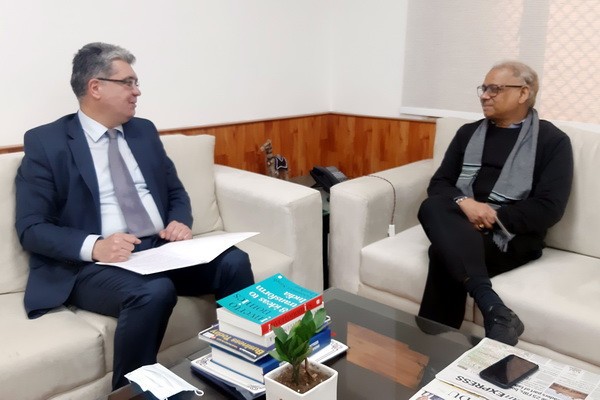Monitoring Desk: India and Uzbekistan bilateral relations are entering into a new phase of a collective regional approach.
Ambassador of Uzbekistan to India Dilshod Akhatov met with the Special Secretary at the Ministry of Commerce and Industry of India Bidyut Behari Swain on January 31 and both discussed the issue of ensuring the effective implementation of the agreements reached following the 12th meeting of the Intergovernmental Commission (IGC) on Trade, Economic, Scientific and Technical Cooperation.

According to UZDaily News Agency, an agreement was reached on organizing regular negotiations between importers of products made in Uzbekistan, which are in great demand in India, and Uzbekistan producers.
Meanwhile, Uzbekistan attended the e-ITEC program “Preparation and assessment of industrial, infrastructure and sustainable projects”, proposed by the grant of the government of India, which was attended by a group of specialists of the Ministry of Innovative Development of Uzbekistan.
Representatives of the Entrepreneurship Development Institute of India (EDII) covered various aspects of preparation and assessment of industrial and infrastructure projects on a sustainable basis. On 22 January, the final virtual event of this international program was held, which was attended by officials from the Development Partnership Administration of the Ministry of External Affairs of India, the Embassy of India in Tashkent, EDII, as well as officials of the Ministry of Innovative Development of Uzbekistan participating in the program.
India and Uzbekistan would also enhance collaboration in religion tourism and the Embassy of Uzbekistan in India hosted a meeting with the General Secretary of the Jama Masjid Advisory Council, Syed Tariq Rehmat Bukhari for discussing the issues of increasing the flow of foreign tourists to Uzbekistan, in particular, further activation of ongoing activities on the wide use of pilgrimage tourism potential.
It was noted that the tourism sector is one of the priority areas of cooperation between Uzbekistan and India, and the confidence was expressed that the cooperation between the two countries will gradually resume in this area as the situation due to the ongoing pandemic in the world stabilizes.
Following the meeting, an agreement was reached to hold virtual presentations between travel companies of Uzbekistan, India, and Bangladesh to get more detailed information about the range of benefits provided to air carriers and tour operators for safe tourism in Uzbekistan in the context of the pandemic.
India and Uzbekistan would also try to work together in the footwear and leather industry and the Embassy of Uzbekistan in India hosted a meeting with the head of the Indian company East-West Tanners, Muhammad Yunus, and the Managing Director of Footwear Design & Development Institute, Arun Kumar Sinha. At the meeting, the Indian side was informed in detail about the existing opportunities in the leather and footwear sector of Uzbekistan. Specific project proposals for mutually beneficial cooperation were presented.
New Delhi Updates:
On February 7, the Ambassador of Uzbekistan Dilshod Akhatov met with the Director-General of the Indian Council for Cultural Relations Dinesh Patnaik, reports “Dunyo” IA correspondent.
It was noted that the respective centers and friendship societies in the two countries are actively developing cultural ties. In this context, the issue of creating a Center for the Uzbek language and literature at Delhi University was discussed.
The sides considered the prospects for organizing scientific and cultural exchanges, including holding international conferences this year. The parties also exchanged views on the possibility of increasing the number of grants allocated by the Indian Council for Cultural Relations for Uzbek youth in the bachelor, master, and doctor of sciences.
